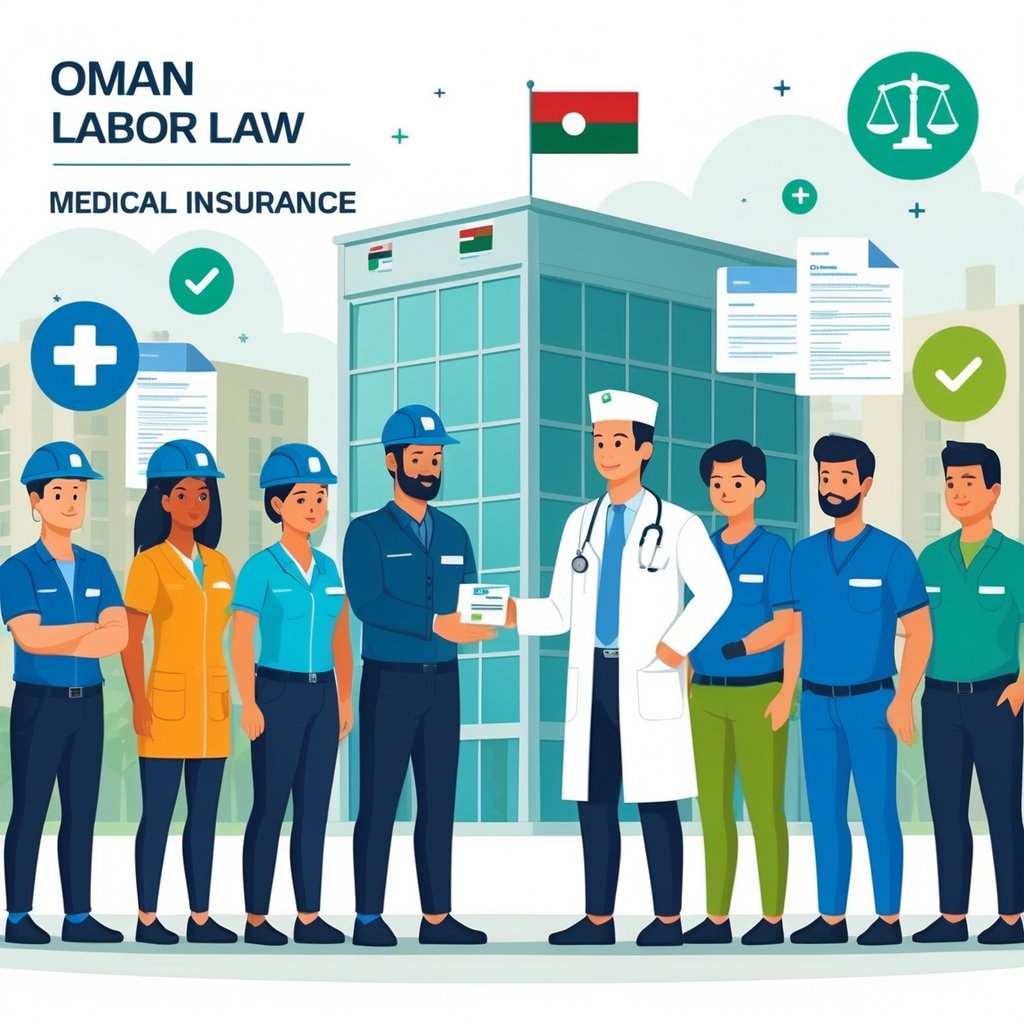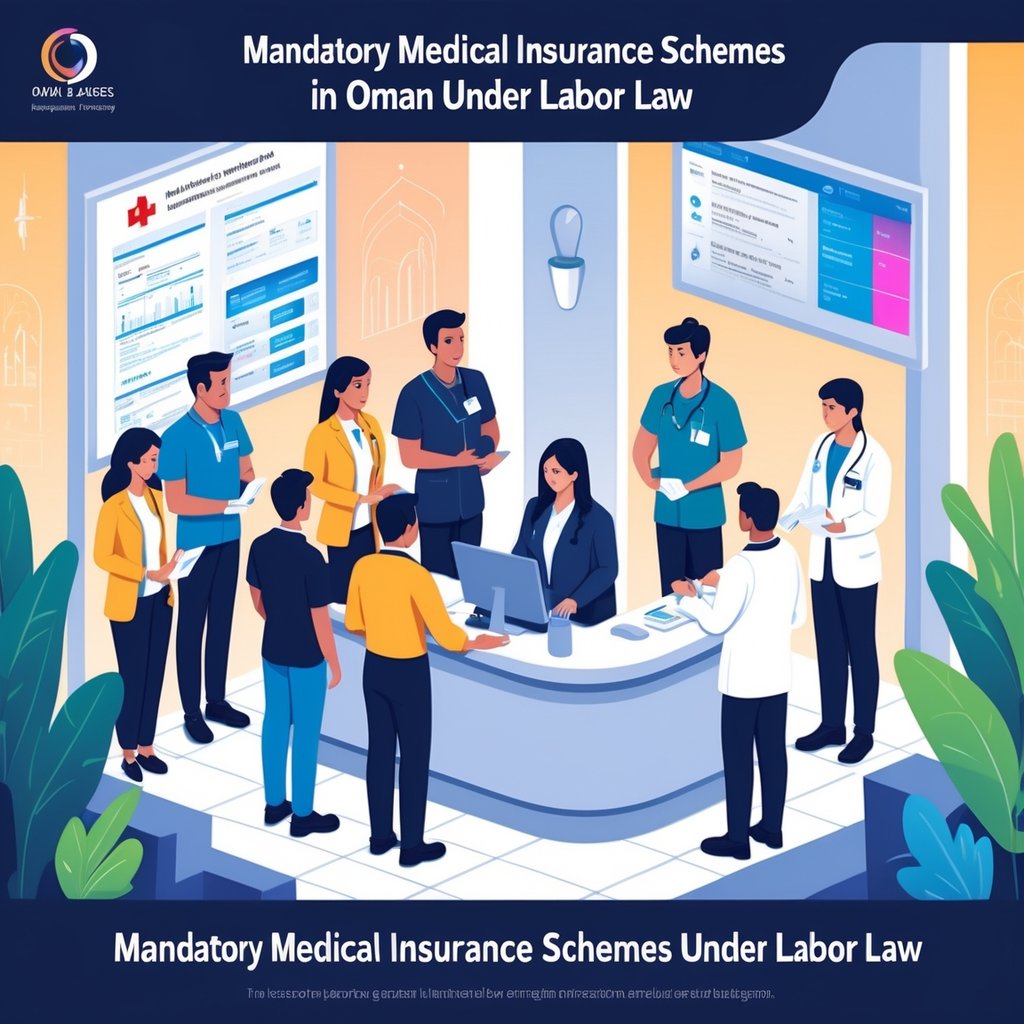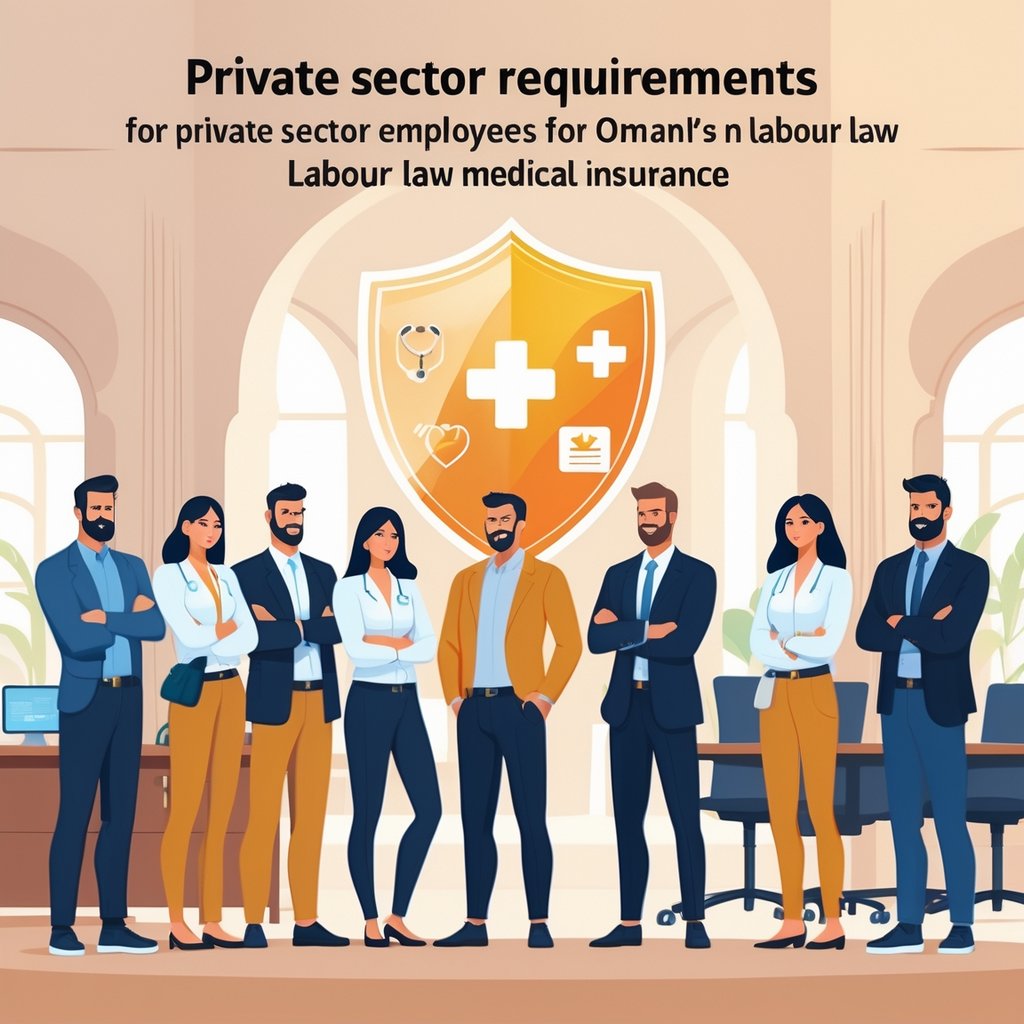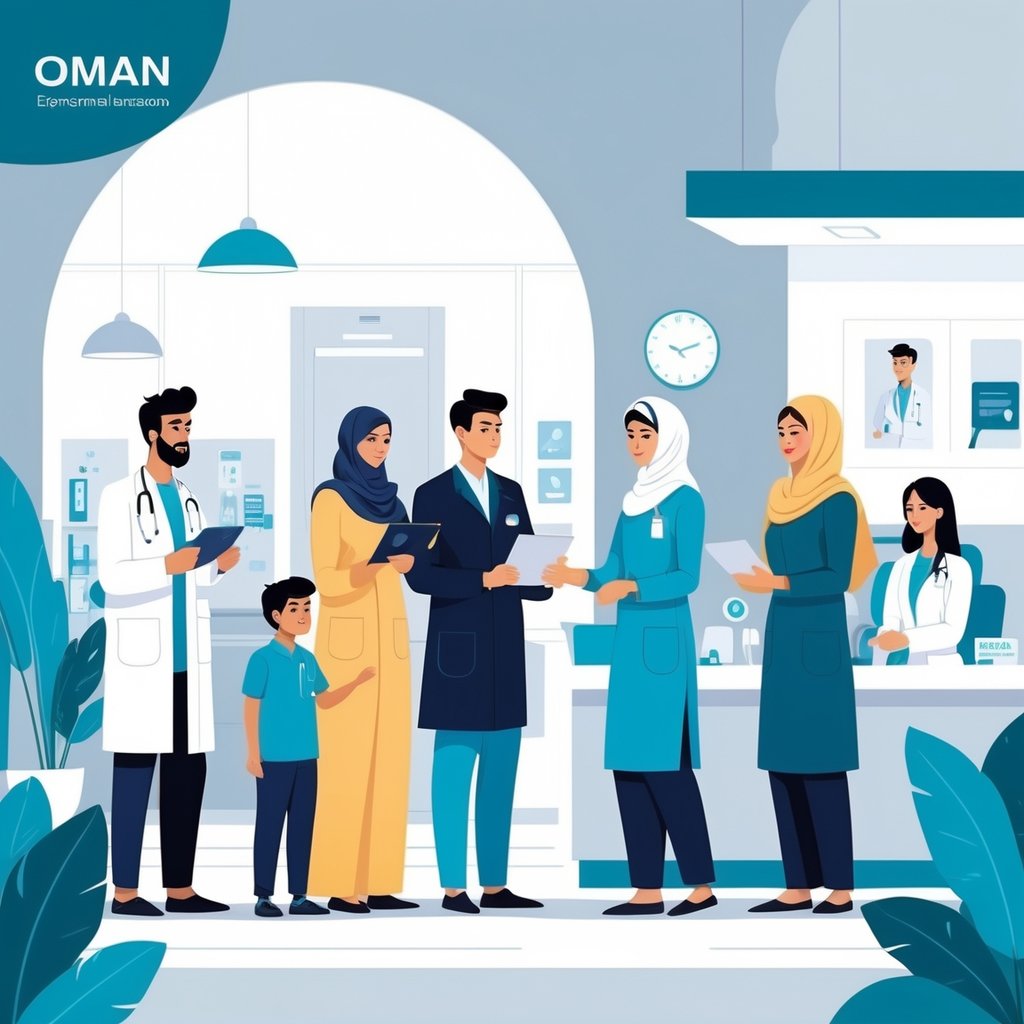Working in Oman’s private sector means you need to know the medical insurance rules. Both employers and employees have to pay attention.
The country has rolled out strict health insurance regulations. These rules impact millions of workers, especially expatriates and those in the private sector.

Oman makes private sector employers provide medical facilities and health insurance for employees under Labour Law. The Dhamani health insurance scheme now covers over 2 million people.
This mandatory health insurance scheme called Dhamani started in March 2019. It covers all private sector workers and visitors.
Employers need to know these requirements before setting up shop in Oman. Employees should also get familiar before starting work.
The rules spell out coverage limits and specific duties for different worker types. If employers don’t comply, they can face legal trouble.
Key Takeaways
- Private sector employers in Oman must provide medical insurance through the Dhamani scheme, with at least OMR 4,500 coverage each year
- These health insurance rules apply to all private sector employees, expatriates, and their dependents living in Oman
- Employers must use licensed insurance companies and stick to electronic claim systems on the Dhamani Platform
Overview of Oman Labour Law Medical Insurance

Oman tells employers to provide medical coverage for workers under clear legal rules. The Dhamani health insurance scheme covers private sector employees and expatriates, and employers pay the premiums.
Legal Requirements for Employers
Oman Labour Law Chapter 3 says employers must give medical facilities to all employees at work. This goes for locals and expatriates.
Companies with more than 100 employees in a single location must hire a qualified nurse. They also need to provide access to specialist doctors and extra medical services.
Private sector employers have extra duties for expatriate workers. The law expects you to pay medical expenses for your staff.
Key employer duties:
- Provide basic medical facilities
- Hire medical staff for bigger workplaces
- Pay for employee healthcare
- Make sure employees can see licensed doctors
Most companies just buy group insurance policies for their teams.
Purpose and Scope of Coverage
The Dhamani unified health insurance policy sets the minimum standards for residents. Insurance must include basic benefits to protect employee health and keep people productive.
Required coverage:
- Inpatient hospital care
- Emergency medical services
- Treatment for basic illnesses that affect work
- Prescription drugs from Ministry of Health licensed doctors
Employers can add extras like pregnancy care, childbirth, child health, dental, and vision if they want. These perks can help attract talent.
The system covers over 2 million people, including private sector workers, expatriates, and foreign visitors.
Recent Legal Developments in Medical Insurance
In March 2019, Oman rolled out compulsory health insurance with the Unified Health Insurance Policy. The Capital Markets Authority set this up under Resolution No 34 of 2019.
The new law says all residents must have minimum medical coverage. The government releases this system in phases after getting the green light from the Council of Ministers.
The law already made employers pay for employee health expenses. Now, the new rules make standards clearer.
The mandatory system tries to improve healthcare quality and create jobs in insurance and health. It also opens the door for international insurers to offer better products in Oman.
Mandatory Medical Insurance Schemes in Oman

Oman set up the Dhamani mandatory health insurance scheme to give medical coverage to private sector employees, expatriates, and visitors. The Capital Markets Authority controls this system and enforces the use of standardized policies.
Dhamani Scheme Overview
The Dhamani scheme covers over 2 million people. Employers pay health insurance premiums under this mandatory program.
Core coverage:
- Inpatient hospital care
- Emergency medical services
- Treatment for basic illnesses that affect work
- Prescription drugs from Ministry of Health licensed doctors
Optional extras:
- Pregnancy and childbirth care
- Child health services
- Dental treatment
- Eye care
Resolution No. 34 of 2019 sets the minimum coverage. You need this insurance for direct billing with medical providers in Oman.
Registration is a must. If your data is incomplete, your access to care will be limited.
Companies must send compliance forms to their insurance carriers for workers in Oman.
Implementation Timeline and Phases
The mandatory health insurance rollout started in 2023 and uses a phased approach. The Council of Ministers signed off on the gradual schedule.
Your coverage depends on when your employer’s phase starts. The system focuses on private sector workers first, then moves to others.
The Social Protection Law adds coverage for work injuries and occupational diseases for expatriates. This kicks in three years after the law was issued.
Oman has about 1.78 million expatriates, so the phased rollout aims for a smooth transition. Employers get notified when it’s their turn to join.
Entities Responsible for Regulation
The Capital Markets Authority set up the unified health insurance policy under Resolution No. 34 of 2019. This body sets policy standards and checks compliance.
The Ministry of Health licenses doctors who can prescribe covered meds. You only get prescriptions covered if you see these licensed providers.
The Council of Ministers approves major changes and phases. Employers have to follow the rules from these government bodies.
International insurers can now join the Oman market. This means more options and jobs in the insurance sector.
Coverage Requirements for Private Sector Employees

Private sector employees in Oman get health insurance through the mandatory Dhamani program. The unified health insurance policy spells out the minimum benefits every employer must provide.
Inpatient Care Benefits
Your inpatient care covers hospital stays and big medical procedures. The unified policy sets minimums for all hospital expenses.
Required inpatient benefits:
- Room and board
- Surgeries
- Medical equipment and supplies
- Physician fees during stays
- Lab tests and imaging
Employers must give coverage for emergencies and planned admissions. The policy includes specialized treatments and intensive care if needed.
You might need pre-approval for non-emergency procedures. It’s smart to check with your insurer before booking elective surgeries.
Emergency Services Coverage
Your mandatory policy fully covers emergency medical services. You can get emergency care at any approved facility, no need for prior approval.
Emergency coverage:
- Ambulance rides
- Emergency room visits
- Urgent diagnostic tests
- Emergency surgeries
- Stabilization treatments
You get 24/7 coverage at approved hospitals and clinics. Emergency services can’t be denied if you can’t pay upfront.
The policy covers accidents and sudden illnesses needing immediate attention. You won’t get penalized for going to a non-network facility in a real emergency.
Policy Limits and Deductibles
Your insurance policy has specific yearly benefit limits and cost-sharing rules. The Capital Markets Authority sets the minimums for every policy.
Common features:
- Annual benefit maximums
- Per-incident limits
- Prescription drug caps
- Yearly deductibles
Most policies ask you to pay a fixed amount for some services. You might pay for doctor or specialist visits.
Employers pay the premium as the law requires. You can buy extra coverage for services beyond the basics.
Medical Insurance for Expatriates in Oman

Expatriate workers in Oman get health coverage through their private sector employers. The system protects work-related injuries and spells out how claims work.
Insurance Obligations for Expatriate Employees
Private sector employers must provide health insurance for all expatriate employees under Oman’s labour law. Companies can’t skip this step.
The Dhamani scheme covers over 2 million private sector employees and expatriates. Employers must arrange this insurance as part of the job.
Coverage limits:
- Annual policy limit: OMR 4,500
- Inpatient care: OMR 3,000 sublimit
- Outpatient care: OMR 500 sublimit
These basic mandated amounts are the legal minimum. Companies can offer more if they want.
Work Injuries and Occupational Diseases Coverage
Employers must pay for all medical expenses tied to work injuries and occupational diseases. This holds true for treatment at government or private hospitals.
If you get hurt at work, your employer covers all treatment costs. This goes even if regular insurance doesn’t cover it.
Work injury benefits:
- Full medical treatment coverage
- No policy limits for work injuries
- Coverage at government and private facilities
The law puts these costs on the employer. You shouldn’t have to pay out of pocket for legitimate work-related medical care.
Claim Process and Repatriation Provisions
Your health insurance claim process runs through the Dhamani system. Most private sector employees get care at approved medical facilities using their insurance cards.
For inpatient care, use facilities within the insurance network if you can. Emergency treatment receives coverage no matter where you go.
Repatriation Coverage:
- Medical repatriation for serious conditions
- Coverage for treatment that’s not available locally
- Coordination with your home country healthcare if needed
Claims usually process within 30 days for standard treatments. More complex cases like repatriation might need extra documents and more approval time.
Provisions for Omani National Employees

Omani nationals have access to government healthcare through the public system. Social insurance coverage reduces what employers need to provide for medical insurance.
Employers may get partial exemptions from private insurance requirements if Omani employees already have government coverage.
Access to Government Medical Facilities
Omani citizens use the Ministry of Health’s public system for healthcare. You can visit government hospitals, clinics, and specialized medical centers across Oman.
The public system covers most medical services at no cost for Omani nationals. This includes emergency care, checkups, surgeries, and specialist treatments.
Your employer might not need to provide the same private medical insurance required for expatriate workers. The government system acts as your main healthcare coverage.
Some employers still add private insurance for Omani employees. This can mean faster access to private hospitals and extra services not covered by public facilities.
Role of Public Authority for Social Insurance
The Public Authority for Social Insurance manages healthcare benefits for Omani workers in the private sector. Your employer pays into this system for you.
Social insurance covers work injuries and occupational diseases. The mandatory health insurance for expatriate workers is a separate system for non-citizens.
The authority works with the Ministry of Health to make healthcare access smooth. Your social insurance number connects to government medical records and treatment history.
Benefits can include rehabilitation services and long-term care if needed.
Employer Contributions and Exemptions
Your employer pays social insurance contributions based on your salary. These payments fund your healthcare and other social benefits.
Private sector employers can get exemptions from extra medical insurance requirements for Omani employees. The labour law provisions recognize existing government coverage.
Key exemption areas include:
- Reduced private insurance premiums
- Lower medical facility requirements at workplaces
- Simplified compliance procedures
Some employers add enhanced medical benefits beyond government coverage. This might include faster private healthcare access or international treatment options.
Employers still need to maintain workplace safety standards and provide immediate medical care for work injuries. Basic first aid facilities stay mandatory no matter the insurance setup.
Optional and Additional Medical Insurance Benefits

Oman’s mandatory health insurance lets employers offer coverage beyond the basics. Employers can choose to cover pregnancy, birth, child health, and dental and eye care as optional benefits under the Dhamani scheme.
Dependent and Family Coverage
You can extend medical insurance to your employee’s dependents and family members. This usually covers spouses and children under certain age limits.
Family coverage acts as an add-on to the employee’s policy. Your company pays extra premiums for each dependent.
Common dependent coverage includes:
- Spouse coverage with full medical benefits
- Children coverage up to age 21 or 25 if studying
- Emergency medical care for all family members
- Outpatient and inpatient services
Costs depend on family size and coverage level. Many employers offer this to attract skilled workers.
You need to verify dependent eligibility with documents like marriage and birth certificates.
Extended Maternity, Dental, and Vision Options
The Dhamani system lets employers add pregnancy, birth, child health, and dental and eye care as optional benefits beyond mandatory requirements.
Maternity benefits often cover:
- Prenatal care and checkups
- Delivery costs in private hospitals
- Postnatal care for mother and baby
- Newborn medical expenses
Dental coverage includes cleanings, fillings, and emergency dental care. Some plans add orthodontics or major dental procedures.
Vision benefits can cover eye exams, glasses, and contact lenses. Advanced plans might include laser eye surgery.
You can adjust these benefits to fit your budget and what your employees need. Additional premiums depend on how much coverage you choose.
Frequently Asked Questions

Medical insurance requirements under Oman labour law set specific obligations for employers. Benefits vary for different employee groups, and costs differ between expatriates and Omani nationals. Penalties exist for non-compliance.
What are the requirements for providing medical insurance to employees in Oman?
Under Oman Labour Law Chapter 3, employers must give employees access to medical facilities in the workplace. If your company has more than one hundred people in one spot, you need to hire qualified medical staff.
You must make sure your employees get basic healthcare services. This could mean having on-site medical facilities or arranging other coverage.
The latest Royal Decree No. 53/2023 makes these requirements stricter for private sector employers. Health insurance provisions must appear in employment contracts.
Are expatriates entitled to the same medical insurance benefits as Omani nationals?
Private sector employers must provide medical facilities to expatriate employees working in Oman. Coverage levels can differ from what Omani nationals get through government programs.
Expatriates usually depend on employer-provided insurance or private coverage. You need to make sure your expatriate workers get proper medical protection as part of their job.
The mandatory health insurance for expatriate workers will come into effect after three years under the new Social Protection Law. This will standardize coverage for foreign workers.
How does the implementation of the Dhamani scheme affect medical insurance coverage?
The mandatory health insurance law in Oman sets a minimum coverage for residents. This includes “Basic Benefits” and “Optional Benefits.”
You need to make sure your employees meet these minimum standards. The scheme aims to make healthcare access more equal for all worker groups.
This system could push international insurance companies to offer better products. Maybe it’ll even create more jobs in the insurance and health sectors.
What are the penalties for companies not complying with mandatory medical insurance laws in Oman?
Companies that break labor laws face heavy fines and legal action. Royal Decree No. 53/2023 brings strict penalties for not meeting employee benefit rules.
You might face business restrictions if you don’t provide required medical coverage. The Ministry of Labour can sanction companies that don’t meet obligations.
Repeated violations bring harsher consequences. These could include license suspensions and more attention from labor inspectors.
How does the cost of medical insurance for expatriates in Oman compare to local nationals?
Expatriate medical insurance costs usually run higher than those for Omani nationals. You’ll generally pay more for foreign worker policies due to risk and coverage differences.
Private colleges and universities sign special contracts with insurance companies for their expatriate staff. These often come with higher premiums than local coverage.
Costs vary based on nationality, age, and job. It’s smart to budget for these higher expenses when hiring expatriate workers.
Are there specific medical insurance plans that employers must provide to their workers under Oman labour law?
The law says you need to give employees access to medical facilities. It doesn’t force you to pick a particular insurance plan.
If your company has more than 100 employees, you’ll need to hire qualified nurses. You also have to make sure workers can see specialist doctors.
You get to choose your insurance provider and decide on coverage levels. Just make sure your team can actually get the medical care they need.
Soon, a mandatory insurance system will set minimum coverage standards. Once that rolls out, you’ll have to pick plans that at least meet those basics.












